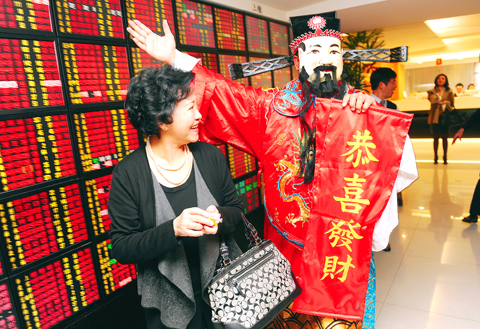Share prices on the Taiwan Stock Exchange closed 1.58 percent higher yesterday, the first trading day after the Lunar New Year holiday, with the benchmark TAIEX rising 118.20 points to finish at 7,560.04.
Reflecting a rally on world stock markets, the stock market opened at the day’s high of 7,619.87, before dropping to a low of 7,553.29.
The strong showing came after US stocks finished higher on Friday for a second consecutive week, despite the US Federal Reserve raising the discount rates to banks for direct loans by 0.25 percent and a lessening of market fears over sovereign defaults in the euro zone.

PHOTO: CHANG CHIA-MING, TAIPEI TIMES
An easing in selling pressure prior to the holiday also helped give a boost to the local bourse, analysts said.
A total of 3.19 billion shares changed hands on market turnover of NT$94.44 billion (US$2.95 billion). Foreign investors and Chinese qualified domestic institutional investors were net buyers of NT$3.43 billion in shares.
All eight major stock categories gained ground, with banking and financial stocks the biggest gainers, showing a gain of 3.94 percent.
“Insurers and banks seem bound to rip gains from an apparent earlier-than-expected worldwide interest rate up-cycle now that China and the US have both increased rates during the Lunar New Year holiday,” SinoPac Securities Corp (永豐金證券) said in a note yesterday.
Chinatrust Financial Holding Co (中信金控) surged by the 6.9 percent daily limit, the biggest advance since June 24, to NT$17.95, leading financial shares higher on the expectation that the nation’s central bank may raise interest rates, KGI Securities Co (凱基證券) analyst Tseng Fan-jen said.
If the central bank does raise rates “it would potentially improve the margins for banks,” Tseng said in a telephone interview.
The New Taiwan dollar surrendered earlier gains in late trading on suspected intervention by the central bank.
The NT dollar closed at NT$32.099 against its US counterpart, little changed from NT$32.100 on Feb. 12, the last day of trading before the Lunar New Year break, Taipei Forex Inc said.
The currency, which has strengthened 8.6 percent in the past 12 months, retreated in late trading as the central bank bought the greenback, said traders who asked not to be identified.
“Definitely there’s some intervention,” said Joanna Tan, a regional economist at Forecast Singapore Pte.
“The central bank’s stance is still the same. It’s to keep the New Taiwan dollar competitive for exporters,” she said.

WEAKER ACTIVITY: The sharpest deterioration was seen in the electronics and optical components sector, with the production index falling 13.2 points to 44.5 Taiwan’s manufacturing sector last month contracted for a second consecutive month, with the purchasing managers’ index (PMI) slipping to 48, reflecting ongoing caution over trade uncertainties, the Chung-Hua Institution for Economic Research (CIER, 中華經濟研究院) said yesterday. The decline reflects growing caution among companies amid uncertainty surrounding US tariffs, semiconductor duties and automotive import levies, and it is also likely linked to fading front-loading activity, CIER president Lien Hsien-ming (連賢明) said. “Some clients have started shifting orders to Southeast Asian countries where tariff regimes are already clear,” Lien told a news conference. Firms across the supply chain are also lowering stock levels to mitigate

IN THE AIR: While most companies said they were committed to North American operations, some added that production and costs would depend on the outcome of a US trade probe Leading local contract electronics makers Wistron Corp (緯創), Quanta Computer Inc (廣達), Inventec Corp (英業達) and Compal Electronics Inc (仁寶) are to maintain their North American expansion plans, despite Washington’s 20 percent tariff on Taiwanese goods. Wistron said it has long maintained a presence in the US, while distributing production across Taiwan, North America, Southeast Asia and Europe. The company is in talks with customers to align capacity with their site preferences, a company official told the Taipei Times by telephone on Friday. The company is still in talks with clients over who would bear the tariff costs, with the outcome pending further

Six Taiwanese companies, including contract chipmaker Taiwan Semiconductor Manufacturing Co (TSMC, 台積電), made the 2025 Fortune Global 500 list of the world’s largest firms by revenue. In a report published by New York-based Fortune magazine on Tuesday, Hon Hai Precision Industry Co (鴻海精密), also known as Foxconn Technology Group (富士康科技集團), ranked highest among Taiwanese firms, placing 28th with revenue of US$213.69 billion. Up 60 spots from last year, TSMC rose to No. 126 with US$90.16 billion in revenue, followed by Quanta Computer Inc (廣達) at 348th, Pegatron Corp (和碩) at 461st, CPC Corp, Taiwan (台灣中油) at 494th and Wistron Corp (緯創) at

NEGOTIATIONS: Semiconductors play an outsized role in Taiwan’s industrial and economic development and are a major driver of the Taiwan-US trade imbalance With US President Donald Trump threatening to impose tariffs on semiconductors, Taiwan is expected to face a significant challenge, as information and communications technology (ICT) products account for more than 70 percent of its exports to the US, Chung-Hua Institution for Economic Research (CIER, 中華經濟研究院) president Lien Hsien-ming (連賢明) said on Friday. Compared with other countries, semiconductors play a disproportionately large role in Taiwan’s industrial and economic development, Lien said. As the sixth-largest contributor to the US trade deficit, Taiwan recorded a US$73.9 billion trade surplus with the US last year — up from US$47.8 billion in 2023 — driven by strong